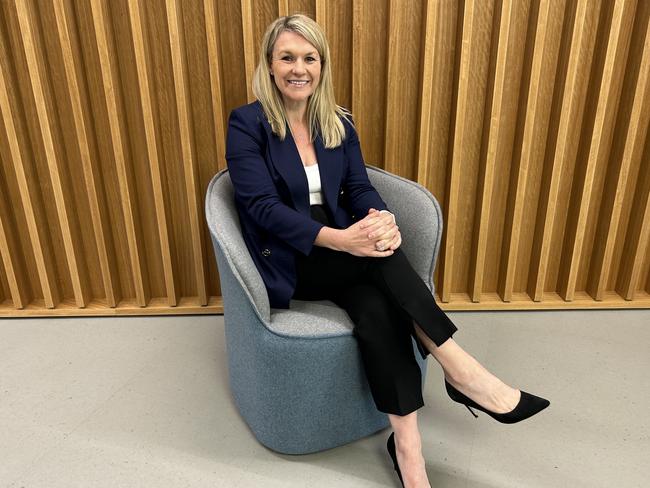Lack of AI training new threat to gender equality in Aussie workplaces
Job ads seeking workers with AI skills have surged 20-fold in the past year – but a significant gender training gap is also emerging.
Careers
Don't miss out on the headlines from Careers. Followed categories will be added to My News.
Demand for artificial intelligence skills is skyrocketing, but a lack of training opportunities for women could prove to be a major setback to gender equality in the workplace.
A 20-fold surge in job ads seeking workers with AI skills has been recorded in the last year, according to recruiter Randstad, who says upskilling in the technology will futureproof careers and earning potential.
While workplace AI training across Australia is lacking, Randstad NSW director Jo Jakobs is especially concerned about the opportunities available to women.
Randstad’s research reveals just seven per cent of Aussie women have been invited by their employers to train in AI, compared to 17 per cent of men.
This is despite more women being open to upskilling in the technology than their male counterparts.
“We know gender inequality is not good. We want to have a workforce that represents our community,” says Jakobs.
“Seventy-five per cent of women say they want to be able to understand AI and use it and have mastery of it but … a significant gap exists between the training they desire and the training they receive.
“It’s imperative that we leverage this readiness (of women to train in AI), otherwise we run the risk of the skills gap increasing, exacerbating existing issues in terms of gender equality and undoing years of hard work to strengthen gender-equal economic growth.”

Own your professional development
The skills gap is seeing more men leverage AI in their day-to-day roles, with almost half (44 per cent) using the technology at work, compared to one in five (21 per cent) women.
Jakobs says the next few years will be critical for building skills in AI, warning that those who do not understand the technology will be left behind.
She says a global analysis of job ads shows a 2000 per cent increase in the number of employers seeking AI skills in the past year.
“This (uptake of AI in the workplace) is as significant as when we went from horses to cars,” she says.
“People need to lean into this moment and stand up and say, ‘Hey, I don’t want to miss out on (learning) these skills’.”
While workplaces have a responsibility to upskill all staff, regardless of gender, Jakobs advises women must “own our own professional development” and also acknowledge the AI skills they may already have.
“We are working (interacting) with AI all the time. AI is as simple as a chat bot on a shopping portal,” she says.
“We downplay our real-life experience and knowledge but we are, as a gender, exceedingly capable.”
She says where formal workplace training is not offered, workers should invest in their own upskilling, starting with basic AI fundamentals and then specifically training in the areas of AI set to impact their role and industry.
Education can be through university, TAFE or more informal means, Jakobs says, noting there is a wealth of information available on the internet and through podcasts.

‘Huge advantage’
Jessica Gleeson has worked within the digital and tech areas of the financial services sector for much of her career.
With generative AI (such as ChatGPT) set to transform all areas of banking, Gleeson was recently appointed as executive of data strategy execution at National Australia Bank. She says she’s looking forward to the employment opportunities technology will create.
“AI is likely to have an impact on everyone’s careers in some way or another and obviously having the opportunity to have early insight could be a huge advantage and something I am really excited about,” she says.
Already, she says repetitive banking tasks are being automated, allowing bankers to refocus on “having deeper, more meaningful conversations with our customers about what they need and how we can help them”.
“What really excites me is how this new technology can reinvent and reimagine jobs for the future,” Gleeson says.
“It’s such a great example of why we need to continue encouraging the next generation to engage in STEM studies so they can have the skills that we might not have needed coming into the workforce 20 years ago.”
No role untouched
The lack of AI training opportunities available to women is a symptom of their disproportionate numbers in the tech sector, Datacom Australia managing director Alex Coates believes.
But she notes there are companies, such as her own, that are addressing the gender imbalance.
She says common narratives around AI, that suggest workers should be “fearful” of its adoption, may be discouraging some from taking up the training that is on offer.
Coates is also concerned many companies lack staff policies dictating the use of AI in the workplace, posing a risk to businesses and workers.
“There’s not going to be one sector that isn’t touched by (AI),” she says.
“It has a really meaningful role to play (in the workplace) and … every organisation should give their workers the opportunity to upskill in AI.”
Women and AI
• 43 per cent of Aussie women believe learning how to use AI will lead to career and promotion prospects
• But only 7 per cent of women in Australia have received AI training in the last 12 months, compared to 17 per cent of men
• 15 per cent of women have actively requested AI training
• Women are more open to upskilling in AI – 23 per cent claim they would prefer to change jobs than learn how to use it, compared to 38 per cent of men.
Source: Randstad


